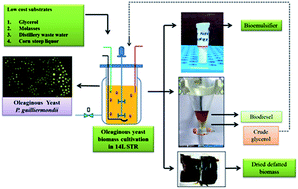Performance evaluation of a yeast biorefinery as a sustainable model for co-production of biomass, bioemulsifier, lipid, biodiesel and animal-feed components using inexpensive raw materials†
Abstract
Oleaginous yeasts have gained increasing attention as feedstock for biodiesel and other value-added products due to their high growth rates coupled with lipid accumulation abilities. However, the development of a technologically and economically sustainable biodiesel manufacturing process from yeasts necessitates the use of low-cost substrates and co-production of value-added by-products in a biorefinery model. Thus, the present study endeavors to concomitantly produce lipid and bioemulsifier from the isolated oleaginous yeast Pichia guilliermondii using inexpensive raw materials. Various low-cost raw materials, such as molasses, crude glycerol, distillery wastewater (DWW) and corn steep liquor (CSL), are tested to develop a judicious combination of substrates for the optimal production of yeast biomass and lipid for biodiesel application. Among the various combinations tested, crude glycerol when supplemented with CSL and mineral salts results in a maximum biomass concentration of 24.47 ± 0.78 g L−1 with 52.09 ± 2.03% lipid on a dry weight basis. Gas chromatographic analysis of the transesterified yeast lipid reveals that the compositions of fatty acid methyl esters vary with the substrates used for lipid production. However, the biodiesel properties are found to comply with the international standards, ASTM D6751 and EN14214. Studies on the emulsification activity reveal the extracellular production of bioemulsifer by the oleaginous yeast. Further biochemical analysis of the lipid-extracted biomass shows that it contains up to 24.6% ± 0.83% protein and 44.2% ± 1.41% carbohydrate, which indicate its potential use as animal feed. A preliminary cost estimate of lipid production shows the economic advantages of cheaper raw materials over synthetic media. Thus, as a proof of a novel biorefinery concept, an efficient and sustainable yeast biorefinery is successfully developed for the concomitant production of biodiesel, bioemulsifier and animal feed-components with simultaneous valorization of waste as low-cost substrates.



 Please wait while we load your content...
Please wait while we load your content...